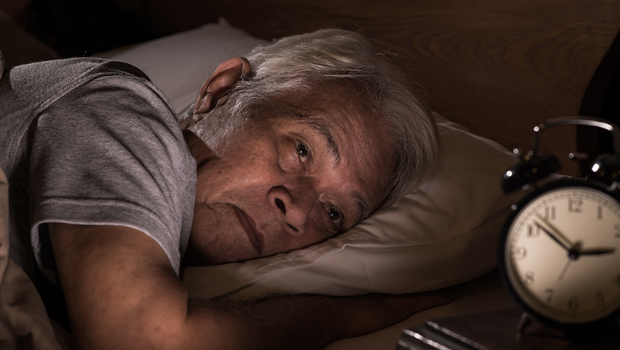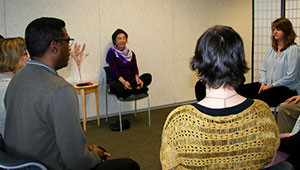Phone therapy for insomnia shown to improve sleep

A study among Kaiser Permanente members with sleep problems and osteoarthritis shows promise for overcoming obstacles to treatment
Effective treatment for insomnia can be delivered in a few short phone calls, according to clinical trial findings published Feb. 22, 2021, in JAMA Internal Medicine.
The study, conducted by researchers at the University of Washington and Kaiser Permanente Washington Health Research Institute (KPWHRI) found that a therapy using only a phone connection dramatically improved access to insomnia treatment for older adults with insomnia and osteoarthritis. The benefits for insomnia were “large” and “robust,” even for patients with more severe insomnia and pain symptoms, the paper states.
“It’s very exciting,” said Susan M. McCurry, PhD, lead author and research professor in the UW School of Nursing, “because when people have insomnia, it’s miserable. Our study has shown that this treatment can be delivered over the phone, and its effects are sustainable for up to a year.”
The study also found a reduction in fatigue and in pain symptoms associated with osteoarthritis, though the pain reductions did not last a full year.
“When people can get relief from their sleep problems,” said McCurry, who is also a KPWHRI-affiliated investigator, “they’re going to function better during the day. They’re going to emotionally feel better, be less irritable, and think more clearly.”
Insomnia — trouble falling asleep, staying asleep, or waking up too early — is a common condition in older adults. Such sleeplessness can be exacerbated by joint pain from osteoarthritis, the most common form of arthritis. Although there are effective therapies for treating insomnia in older adults, many people cannot get the treatment because they live in areas with limited access to the internet and in-person health care, especially sleep clinics.
But basic telephone service is nearly universal among older people. McCurry’s research underscores how people living in rural areas and medically underserved areas could potentially be reached and helped by services delivered over the telephone.
The study, known as the Osteoarthritis and Therapy for Sleep (OATS) study, tracked 327 people with moderate to severe insomnia and osteoarthritis from 2016 to 2018, all in the Kaiser Permanente Washington system, including many who live in rural and medically underserved areas.
“Although osteoarthritis-related insomnia is a very common condition among older adults, it can be a challenge to find and enroll people with this condition in a clinical trial,” said Kai Yeung, PharmD, PhD, co-author and KPWHRI assistant investigator. “Our ability to work with Kaiser Permanente Washington’s extensive electronic health records data made it possible to identify and recruit more than 300 patients across Washington state.”
All the participants received 6 phone calls of 20 to 30 minutes over an 8-week period. During these calls, about half of the patients received materials and guided training called cognitive behavioral therapy for insomnia (CBT-I), a proven and effective strategy used as the first line of treatment for insomnia. The remaining patients were in a control group, which received education-only phone calls that did not include the CBT-I therapy. The control group was important, McCurry said, to make sure the positive effects of the phone calls weren’t due to “the fact that you have someone who’s smart and pleasant calling you every week.”
The key task of the therapy sessions was to guide patients through routines, information, and self-monitoring in order to get their homeostatic sleep drive, which is the internal drive to sleep that is dissipated during the night and builds up during the day, and circadian rhythms, the complex and innate cycles of biochemical, physiological and behavioral processes, working together so that the patient will sleep at night and be wakeful during the daytime.
The phone-based therapy also helped patients reduce anxiety related to sleeplessness.
“People can become conditioned to knowing that when they get into bed, they’re going to have a bad night. The bed becomes an anxious place for them to be,” McCurry said. “We help them develop cognitive tools that can give their mind something else to do other than worry about what tomorrow is going to be like if they don’t get a good night’s sleep.”
While earlier phone-based studies using similar techniques improved sleep, these studies were limited by their small number of participants and included only patients of specialty insomnia clinics. The OATS study was the first large trial of a statewide population of older adults with chronic osteoarthritis who were randomly assigned to either the treatment or a control group.
The study results may offer hope to those suffering from insomnia and osteoarthritis-related pain, but the phone-based system of treatment is not currently offered. Patients should talk to their medical care provider to learn what treatment options are available to them now.
“The bottom line is nobody should be sleeping poorly,” said Michael V. Vitiello, PhD, the study’s senior author and professor of psychiatry and behavioral sciences at University of Washington School of Medicine. “We have ways to fix sleep problems. Older adults don’t need to suffer. We can make them better.”
Co-authors include Weiwei Zhu, MS; Michael Von Korff, ScD; Robert Wellman, MS; and Manu Thakral, PhD, of the Kaiser Permanente Washington Health Research Institute, and Charles Morin, PhD, of the Université Laval in Canada. Thakral is now a faculty member at the University of Massachusetts Boston. This research was funded by U.S. Public Health Service grant 5R01AG053221.
This news release was originally written by Jake Ellison, a public information officer at the University of Washington, for the UW News Service. It has been adapted for publication on the KPWHRI website.
About Kaiser Permanente Washington Health Research Institute
Kaiser Permanente Washington Health Research Institute (KPWHRI) improves the health and health care of Kaiser Permanente members and the public. The institute has conducted nonproprietary public-interest research on preventing, diagnosing, and treating major health problems since 1983. Government and private research grants provide our main funding. Follow KPWHRI research on Twitter, Facebook, and LinkedIn, or subscribe to our free monthly newsletter.
About Kaiser Permanente
Kaiser Permanente is committed to helping shape the future of health care. We are recognized as one of America’s leading health care providers and not-for-profit health plans. Founded in 1945, Kaiser Permanente has a mission to provide high-quality, affordable health care services and to improve the health of our members and the communities we serve. We currently serve more than 12.4 million members in eight states and the District of Columbia. Care for members and patients is focused on their total health and guided by their personal Permanente Medical Group physicians, specialists and team of caregivers. Our expert and caring medical teams are empowered and supported by industry-leading technology advances and tools for health promotion, disease prevention, state-of-the-art care delivery and world-class chronic disease management. Kaiser Permanente is dedicated to care innovations, clinical research, health education and the support of community health. For more information, go to: kp.org/share.
Innovations in Care

Future is now: Virtual care is transforming health systems
Katie Coleman describes how the pandemic boosted adoption of telehealth and how research is vital for it to thrive.
Back Pain Research

Integrative non-drug therapies treat back pain at reasonable cost
Kaiser Permanente researchers Drs. Daniel Cherkin, Karen Sherman, and Andrew Avins produced much of evidence in ICER report.
Read it in News and Events.
Behavioral therapy

Meditation and cognitive behavioral therapy pay off for back pain
Dr. Cherkin reflects on new results suggesting CBT is cost-effective, and mindfulness-based stress reduction may be cost-saving.
live healthy

7 ways to protect your brain—and your thinking power
We’re learning a lot about how everyday actions can prevent or delay dementia. Here’s the latest advice.
Media contact
For more on Kaiser Permanente Washington Health Research Institute news, please contact:
Bianca DiJulio
bianca.s.dijulio@kp.org
206-660-8333
After-hours media line: 206-448-4056


